What is B Corp?
The B in B Corp stands for Benefit. Certified B Corporations, or B Corps, are companies verified by B Lab to meet high standards of social and environmental performance, transparency, and accountability. B Corps consider people, planet, and profit in their operations and actions, to make their impact as positive as possible for as many as possible.
In B Lab’s own words:
'Becoming a B Corp does not mean that a business is perfect. Nor does it override existing industry standards or sit at odds with protecting freedom of expression. B Corp Certification is based on a company’s actions, not its beliefs. While no business has no negative impacts, what makes B Corp Certification unique is a commitment to accountability, transparency, and continuous improvement. As the conversation heats up around the role of purpose in business, it is important we do not let our idea of what business is drift backwards towards an outdated orthodoxy. Business can be a force for good - and UK B Corps should be rightly proud of the part they are playing in leading this change. Let’s continue to harness their potential.'
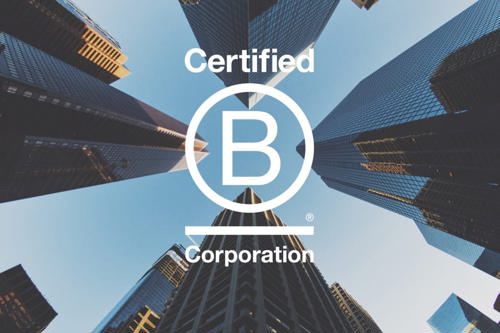
Why chose the B Corp Certification?
B Corps are committed to using business as a force for good. We wanted to become a B Corp, as our mission and values unequivocally align with theirs. We strongly believe in collaborating, within local networks, to build sustainable growth for all stakeholders.
Along with our mission and values, we see the B Corp Impact Assessment as the most comprehensive and over-arching sustainability currently available. There are many standards for environmental impact, which is important, but there are not any others that cover all the UN Sustainable Development Goals so comprehensively. We didn’t want an assessment to give us a green sticker for just turning the lights off when we are out of the room, we wanted to evaluate exactly how sustainable and responsible our organisation is, as well as identify areas we can improve in. As a B Corp, we are counted among businesses that are leading a global movement for an inclusive, equitable, and regenerative economy.
The UK is one of the fastest growing B Corp communities in the world, with over 1,500 UK B Corps, a 50% rise in organisations in the UK getting certified over the past year. There are currently over 8,100 B Corps worldwide.
What was the process of the BIA like?
As we mentioned earlier, we chose the B Corp Certification because it is a comprehensive standard for sustainability, and as you would expect the BIA is comprehensive. We would not want it any other way though; to accurately know who and where you are, you must scrutinise and analyse every little aspect of yourself.
The BIA has created 5 key areas for organisations to be evaluated in: Governance, Workers, Community, Environment, and Customers. Organisations gain a score in each area and the total sum of the scores must be at least 80 to become B Corp Certified (we are very proud to say we scored 109.2!), along with some legal requirements. Each area has its own list of questions relevant to your organisation, and sometimes depending on your answer, more questions appear. The questions are there for B Lab to understand exactly what you do and what your impact.
A lot of the BIA, as you would expect, is providing proof for all the things you say you do e.g. the spreadsheet you track your energy consumption on or the learning and development you make available to staff. We didn’t want an assessment to give us a green sticker for turning the lights off when we’re out of the room, we wanted to evaluate exactly how sustainable and responsible our organisation is, as well as identify areas we can improve in.
Once you submit your completed BIA, it enters the evaluation stage where B Lab ensure your BIA is ready for verification and the verification questions. Yes, more questions. In this stage the analyst highlights questions from your BIA which they want some additional information and supporting documentation for. You are also given the opportunity to comment on why certain areas are the most important to you. It is a good opportunity to describe why you take pride in what you do.
After all of that, and a few final bits of admin to tidy up, your BIA is submitted to the certification stage. This is the final and official yes or no, where if you have a score of 80 or above, you have a pretty good chance of becoming a B Corp Certified organisation. The process is long and involves hard work, but the end result is very rewarding. Even if you do not achieve the 80 points and certification, it will highlight exactly where to improve and how, paving the road for you and your organisation’s B Corp journey.
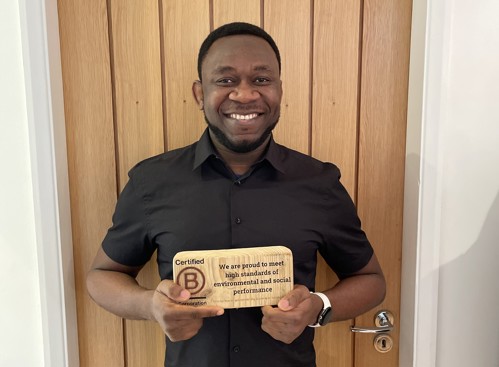
What was your timeframe for the B Corp Certification?
Right from when NuGreen started in October 2020, we had aspired to become a Certified B Corp. Clare, our founder, had it as an aspiration to develop NuGreen into a sustainable organisation with strong social and environmental values, hence our company values: Teamwork, Integrity, Discovery, and Collaboration. In fact in October 2020, Clare was our only member of staff.
The NuGreen team grew in 2022 (meaning Clare had someone to talk to) and in November 2022 we started our BIA, embarking on the lengthy assessment as mentioned earlier. Just over 1 year later in November 2023, we proudly joined the fast-growing community of B Corporations, by officially becoming a Certified B Corporation, with a score of 109.2.
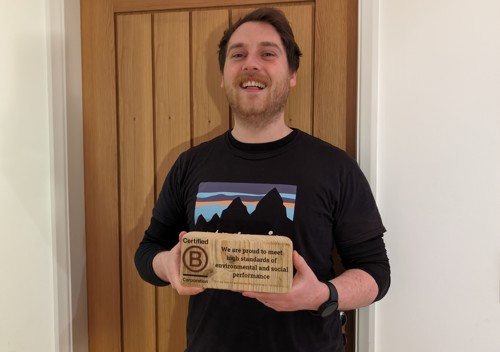
What were the trickiest areas to measure/monitor and complete?
There are a lot of metrics within an organisation which are tricky to measure and monitor, luckily you don’t have to track every single one of them for your BIA. Obviously, we want to track each aspect of our impact, but B Corp is about the journey, not perfection or being the best. There were areas in the outcomes of our services that we were not able to track yet, such as beneficiaries and long-term carbon reductions, but when we can track it, we will.
In terms of what we included in our BIA from what we can and do track, the most difficult areas were calculating a carbon footprint, mainly due to a lack of easily obtainable data. For example, we track our office recycling, but rely on generalised averages for carbon conversions. There is a lack of data out there for Scope 3, making it hard to fully know our impacts. Although not technically something that one tracks, obtaining all the required documentation for the BIA can be a challenge, especially for larger businesses. The process involves communicating with many different departments or individuals, to ensure that all documentation is submitted punctually. Conveniently for our application, we are a small team all buying in to the B Corp certification, so it was a smooth process from start to finish.
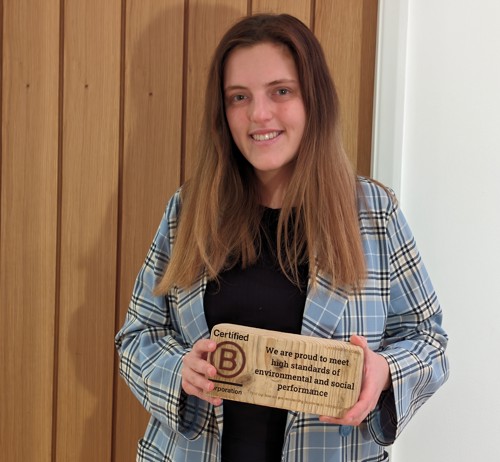
What happens when you are approved?
Well first things first, a cork is popped. After that, there is a fantastic sense of pride and achievement as you are now amongst the leading organisations worldwide, using business as a force for good. Then your wooden block arrives in the post, and it all starts to sink in. Completing the BIA is no walk in the park, let alone becoming certified, so it is important to celebrate that fact as well. Pats on the back all round.
You also join a fast-growing network of like-minded people and organisations, who are B Corp Certified like you. The network opens up opportunities for fruitful collaborations, sharing best practice, and enjoyable interactions with other B Corps. You are part of an expanding voice which is spreading the word of Benefit Corporations. If all of that wasn’t enough, you get to see that little B next to your company logo each day.
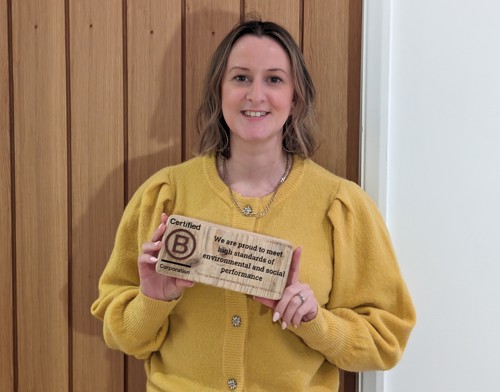
Why should you take the BIA?
We think every business should carry out an impact assessment. Number 1 its free!!! So there’s nothing to loose. It gives you great guidance on areas of your business that you could or should be measuring and that should be continuously reviewed and updated, for example checking language is inclusive and updating policies. If you are unsure where to start this is a great resource to use even if you don't go on to get certified straight away.
What happens next?
To be certified opens up doors. The prestigious certification signifies the high standard of your responsibility and accountability. Now more than ever, environmental and social responsibility is weighted heavily in business decisions (e.g. preference towards companies with strong ESG values). Having the B next to your company logo shows everyone that your organisation operates to better the world. This increases opportunities for future positive collaborations and partnerships, promoting equitable growth.
B Corp is a perpetual journey of self-improvement, much like sustainability, it is not a one-time action but a constant effort lasting generations. B Corps must recertify every 3 years to maintain their certification, with the idea to constantly improve where possible, rather than stagnate or regress. By having this mentality of always aspiring for progression, to good and to do better, we can make a truly positive impact on the population and planet.
Written By Rufus Henderson
